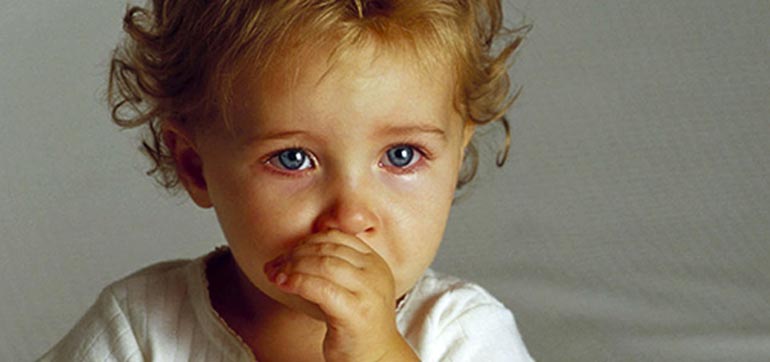How comfortable a child will feel in kindergarten, mainly depends on the success of his adaptation to the conditions of this institution. However, are future pupils and their parents ready for it?
Let us take a look at this problem through the eyes of an experienced educator, who daily encounters a mass of rather sad stories.

Episode One: baby and prolonged breastfeeding
The pink-cheeked Katyusha entered the nursery four months before her third birthday. Crying a little while parting with her mother, she was soon comforted and carried away by the game with other children. The first alarm bells sounded immediately after breakfast: a whimpering little girl loitered around the corners, defiantly sucked her finger and continuously called her mother.
Having decided that adaptation was the fault and not telling her mother about the daughter’s behavior, two hours later the young teacher said goodbye to the cheerful pupil. Over the next few days, the teachers continued to observe the same picture: after breakfast, Katyusha cried inconsolably, refusing flatly to play with her peers, and still demanded her mother. Finally, one of the teachers, intrigued by the strange behavior of the child, asked her mother how she could explain her daughter’s whims.
Mom's answer put everything in place. It turned out that the girl, who had been breast-fed for a long time, was weaned from her mother’s breast two days before visiting the nursery. “It's okay,” my mother assured, “Katyusha has already grown enough. Sniff a little and get used to it ".
Responsible parents should remember that for a tiny baby, weaning from the mother’s breast is in itself a huge stress. That is why specialists in breastfeeding at this moment advise not to expose the baby to any additional experiences.
In the situation described by us, it turned out that the mother, who initially cared about the health and psychological comfort of her Katyusha, suddenly decided that her three-year-old daughter had become so adult that she would easily get used to her unusual environment.
Teacher tip:
A baby who is breastfed should either be weaned from her mother’s breast two months before the start of the visit to the nursery group, or not be weaned until he finally adapts to new conditions and the daily routine in the preschool.
Breastfeeding and kindergarten - is it possible to combine?
As a consultant on breastfeeding, I often hear this question from a nursing mother when the baby is 2 years old: “How to wean a baby from the breast, because we will soon be in kindergarten?” Is it necessary to excommunicate a child in front of a kindergarten? -https://kid.htgetrid.com/en/kormlenie-grudyu/kormlenie-grudyu-i-detskiy-sad-vozmozhno-li-sovmestit.html
We read a useful article about how to wean a baby
Episode Two: Nastya clumsy
Tiny Nastya was sent to a nursery due to the fact that her young mother, paying a loan for the purchased housing, was forced to urgently go to work. An hour later, the teacher stated with despondency: the girl was not taught anything.
One and a half year old baby, not accustomed to the pot, constantly urinated in her pants (how to teach a pot), did not know how to eat with a spoon (how to teach eat with a spoon), drink from a mug (how to teach drinking from a mug), washed her hands and was not able to at least show what she wants, did not want to play with other children.
After talking with her mother on the phone, the teacher found out that the girl is still drinking from the bottle and continues to suck the nipple (how to wean from the nipples) To the reasonable question of the educator about why the baby does not possess elementary skills, the answer was received: “I don’t even know, but had to be taught?”
Just think for a moment: is the educator and his assistant able to feed twenty babies at once who don’t know how to use a spoon? Even if there are three or four such “ineptties” in the group, they will remain half-starved, since it is very difficult to fully feed each baby in the time allotted for food.
A one and a half year old healthy baby, who does not have developmental disabilities, is able to independently eat with a spoon, ask for a toilet, show what he wants (or where he has pain) and be interested in communicating with other children.
Teacher tip:
A kid entering kindergarten should have basic self-care skills (regardless of age of admission). This will make life easier for him and his parents and employees of the kindergarten. Adaptation of a prepared child is much more successful.
We also read: what a child should be able to do in front of a kindergarten - 4 useful skills
Episode Three: Andryushins fears
The first two days Andrei spent in the kindergarten were successful: he really liked it. However, after the weekend the child couldn’t recognize: the mother literally shoved Andryusha sobbing and resisting Andriyusha into the group, and the teacher had a lot of work to keep the boy eager for the leaving mother.
This went on for several days. After the mother left, the sobbing Andryusha sat alone in the corner, calming down only towards the end of breakfast, but hourly pestering the teacher and the nanny with the question: “Will mom come after me?”
The reason for this behavior was found out quite by accident. The teacher, who looked into the locker room, heard how the mother, dressing the boy, reprimanded him: "You will not obey me - I will leave you to spend the night in a kindergarten with a watchman."
What normal child after such words wants to voluntarily stay in kindergarten?
Teacher tip:
Never scare your baby yourself and do not let anyone else do it. Neither the evil aunt, nor the Baba Yaga, nor the policeman (and even more so the kindergarten) should become the culprits of children's fears. All these horror stories, composed for the mythical one-time benefit, are not so harmless for the fragile children's psyche.
Episode Four: Sonya and her hardworking mom
Sonya first came to kindergarten on Monday. Being an intelligent and sociable child, she immediately found a common language with most of the children in the group. The time allotted for the first day of adaptation passed for her merrily and unnoticed. Mom, who came for Sonia, warned the teacher that two days later she needed to go to work, so on Thursday the girl would stay in the group for the whole day.
“Why didn’t you come early to give Sonya the opportunity to get used to the new conditions for her?” - the surprised teacher asked. Mom’s answer was rather strange: “I wanted my daughter to stay at home as long as possible.”
The result was logical. On Thursday, after the children had lunch, Sonya began to worry, asking the teacher when she would be taken home.A sincere woman tried to reassure the girl, explaining to her that her mother, forced to go to work, could pick her up only in the evening.

By evening, the yearned baby could no longer hold back her tears. The next morning, the scene with tears repeated: the irritated mother led the sobbing daughter into the kindergarten, explaining for the hundredth time how she needed this work. The adaptation, which began so successfully, was practically frustrated.
There is no greater test for the psyche of a child who is used to being with his beloved mother all the time than her sudden absence for many hours and her replacement by some unfamiliar people, coupled with a radical change in her usual way of life.
Finding himself in this situation, the baby believes that he was simply abandoned due to the fact that he did not please his mother with something, who would not come for him again. Mom’s explanation regarding the need to go to work is nothing more than a collection of obscure phrases for him, and he perceives the current situation as a real betrayal.
Teacher tip:
Adaptation (the process of a child’s leisurely phased adaptation to the children’s team, to the new regime of the day, to carers) is necessary in order to protect the vulnerable child psyche from the influence of a strong stressful situation.
If you make it gradual, you can avoid many unpleasant moments: nervous breakdowns, tears, tantrums when saying goodbye to mom and the anxious expectation that haunts the baby for a whole day.
We also read: adaptation of the child to kindergarten - what parents need to know
How to wake a child in kindergarten without vagaries -https://kid.htgetrid.com/en/eto-polezno-znat/kak-razbudit-rebenka-utrom-v-detskiy-sad-bez-slez-mucheniy-i-kaprizov.html
Loving parents during the period of adaptation of the child to kindergarten should surround him with their love, care and understanding, showing maximum tact and parental patience.
Watch a video on how to properly prepare a child for kindergarten:
5 more errors during adaptation









Our adaptation process was very difficult. The child never wanted to stay in the kindergarten. Neither persuasion nor promises of gifts and entertainment on the weekend helped. In the evening, I had a conversation with my daughter, she agreed that you need to go to the kindergarten, and in the morning everything will be new: tears, screams, pleas do not leave her. Everything was decided by gradual addiction: she took her to the garden and left her first for an hour, then for two, then for half a day, etc. For 2 weeks, the daughter got accustomed, made friends with the guys. Now we walk without problems.
I also want to add that a lot depends on the situation in the kindergarten, on teachers and their attitude towards children. My daughter never wanted to go to kindergarten, constant tears and tantrums, but as soon as the teacher changed, she walks with pleasure